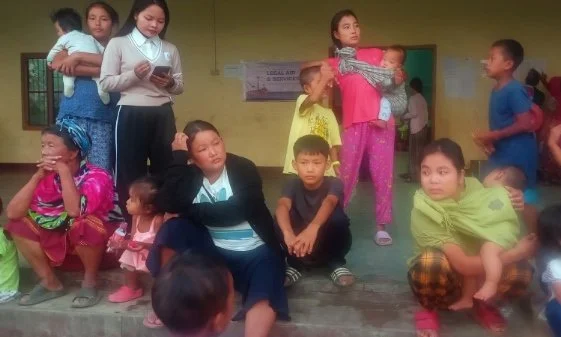Manipur: Centre Refuses UT Demand Ignoring Kuki-Zo’s De Facto Separation
Centre Acknowledges Suffering, Not the Administrative Collapse in the Hills
November 9, 2025
Displaced Kuki-Zo families in a relief camp in Churachandpur district.
The Union home ministry reportedly held talks with two armed Kuki-Zo groups on November 6 and 7. The groups said they could no longer live under the Manipur government. The Centre said it understood their pain but would not create a new Union territory. That policy now stands at odds with the reality of Manipur.
The Kuki National Organisation and the United People’s Front asked for a Union territory with a legislature, saying “coexistence under Manipur’s current set-up is no longer possible,” as reported by The Telegraph.
The hills, where the Kuki-Zo tribal minority resides, remain cut off since the violence began on May 3, 2023. More than 260 people died, and over 60,000 were forced out of their homes. Most have not gone back. Villages are still abandoned. Many of them never will return. No one crosses the old roads.
There are no police, doctors, teachers or officials from the Meitei community who served in the hills before the violence began. The Kuki-Zo community mans its own checkpoints. And no one there will be in a position to report to the Manipur chief minister, whenever one is appointed or elected after President’s rule.
The Kuki-Zo groups also cited historical reasons. They said the hills were excluded from Manipur under British rule, officially designated as “excluded areas.” Their chiefs governed their own people. They said the 1949 merger with India failed to recognise this arrangement.
The Indian Constitution already allows tribal self-rule. It allows special laws for special regions. It has done so for decades. However, the existing constitutional protections do not match the present reality.
In 1971, Article 371C was introduced to provide special constitutional protections to the hill areas. It mandated a Hill Areas Committee (HAC) in the Manipur Legislative Assembly, composed solely of MLAs from the hill districts. The law also gave the Governor the responsibility to oversee the administration of these areas and report to the President annually. Alongside this, the Manipur (Hill Areas) District Council Act created six Autonomous District Councils (ADCs) in the tribal regions, with powers to manage land, resources and cultural practices.
Tribal groups have long accused successive Manipur governments of bypassing the HAC, especially on issues concerning land, forests and development planning. They say major decisions have been made without meaningful consultation, in violation of the spirit, if not always the letter, of Article 371C.
The ADCs have limited powers and depend entirely on the state government for funds and decision-making. Unlike Sixth Schedule councils in other northeastern states, they lack authority over land, forests or taxation. Elections to the councils were delayed for years, prompting widespread protests by tribal student organisations in 2021. Tribal groups have also pointed to eviction drives in villages such as K. Songjang in the Churachandpur–Khoupum Protected Forest as evidence of policies being enforced without consultation or regard for customary land use.
If the Centre continues to reject demands for a separate administration, it must explain how existing safeguards will be made meaningful in a state where they have already failed.
Further, the Indian Constitution does not prohibit territorial reorganisation. Article 3 gives Parliament the power to create new states or Union territories, or to alter existing boundaries. State consent is not required. The Supreme Court has upheld this power repeatedly. The Centre has used it in the past. For example, to create Chhattisgarh, Jharkhand and Uttarakhand, and more recently to reorganise Jammu and Kashmir.
In fact, the case for reorganisation in Manipur has a firmer constitutional basis than many past bifurcations, since the hills already have a distinct legal and administrative identity.
The Centre must either undo the de facto split in Manipur, which appears unlikely anytime soon, or address the realities that the split has created.
You have just read a News Briefing by Newsreel Asia, written to cut through the noise and present a single story for the day that matters to you. Certain briefings, based on media reports, seek to keep readers informed about events across India, others offer a perspective rooted in humanitarian concerns and some provide our own exclusive reporting. We encourage you to read the News Briefing each day. Our objective is to help you become not just an informed citizen, but an engaged and responsible one.

